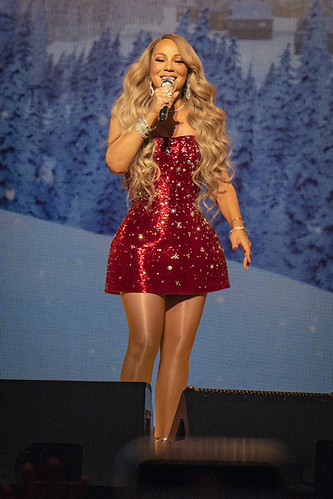Mariah Carey’s ‘All I Want for Christmas Is You’ to top charts again amid copyright lawsuit


Mariah Carey has been slammed with a copyright lawsuit alleging the singer ripped off “All I Want for Christmas Is You” — even as the Yuletide ditty races to the top of the charts.
Since “All I Want for Christmas Is You” was released in 1994, it has ranked No. 1 on the Billboard Hot 100 holiday chart for 57 of the 62 weeks it’s run.
The figure means that every year beginning on Nov. 1 over the past three decades — when it’s socially acceptable to start cranking the holiday playlists again — Carey has nabbed the top spot a staggering 92% of the time.
The song’s annual renewed success reaps Carey some $3 million in royalties.
However, it hasn’t been all jolly for Carey who, the week of Dec. 9, is in the No. 2 spot on Billboard’s holiday chart behind Brenda Lees holiday classic Rockin Around the Christmas Tree.”
Last month, country singer Andy Stone of New Orleans-based band Vince Vance and the Valiants filed a copyright lawsuit in California federal court claiming Carey and her co-writer on the smash hit, Walter Afanasieff, ripped off his group’s song of the same name.
Stone’s All I Want for Christmas Is You was written in 1988 with Troy Powers, he alleged in the filing, according to NBC. The song was recorded and released the following year.
Carey’s song, which was produced and released with the help of Sony Music and Universal Music Group, didn’t take the Christmastime music charts by storm until five years later.
Stone’s suit alleges that Carey copied the “compositional structure of an extended comparison between a loved one and trappings of seasonal luxury, and further includes several of Plaintiffs lyrical phrases,” per NBC.
It cites Stone and Powers’ song’s “unique linguistic structure where a person, disillusioned with expensive gifts and seasonal comforts, wants to be with their loved one.”
The filing goes on to allege that Carey copied this storyline in her iconic lyrics, where she sings about not wanting “presents underneath the Christmas tree” or “to hear those magic reindeer click.”
“I just want you for my own, more than you could ever know,” Carey sings in the famed chorus, suggesting that she’d rather have this one person on her mind rather than all the holiday trappings.
Carey, however, has remained vague over the years as to whether the song is about yearning for a special someone.
In Vince Vance and the Valiants’ version of “All I Want for Christmas Is You” — where Stone plays the headlining band member Vince Vance — they sing to “take back the tinsel, stockings and bows ’cause all I want for Christmas is you.”
But it’s not just the lyrics Carey has ripped off, Stone and Powers claim.
It’s “also the combination of the specific chord progression in the melody paired with the verbatim hook,” which they allege “was a greater than 50% clone of Vances original work, in both lyric choice and chord expressions,” according to NBC.
The lawsuit also notes that Carey’s version of the song has topped the Billboard Hot 100 chart every year since 2019. It fails to point out that Vince Vance and the Valiants’ rendition has never appeared on the song-ranking chart.
The gap in success — which Stone claims was catalyzed by his band’s original idea — has the plaintiffs asking for at least $20 million in damages, NBC reported.
Stone withdrew a similar lawsuit over the same two “All I Want for Christmas Is You” songs last year.
Representatives for Vince Vance and the Valiants did not immediately respond to The Post’s request for comment.
The Post has also sought comment on behalf of Carey at Sony Music and Universal Music Group.
All the while, Carey recently lost her bid to officially crown herself with the trademarked title “Queen of Christmas.”
Last holiday season, all Carey seemingly wanted for Christmas was a trademark, but the US Patent and Trademark Office denied her attempts to nab the already-trademarked titled.
The decision last November meant Christmas came early for holiday songwriter Elizabeth Chan, who successfully blocked Carey from trademarking the “Queen of Christmas” and using it on everything from music to perfume and mugs.
In its decision, the Trademark Trial and Appeal Board noted Careys company, Lotion LLC, had not filed a response to Chans opposition. The paperwork was due in September.

